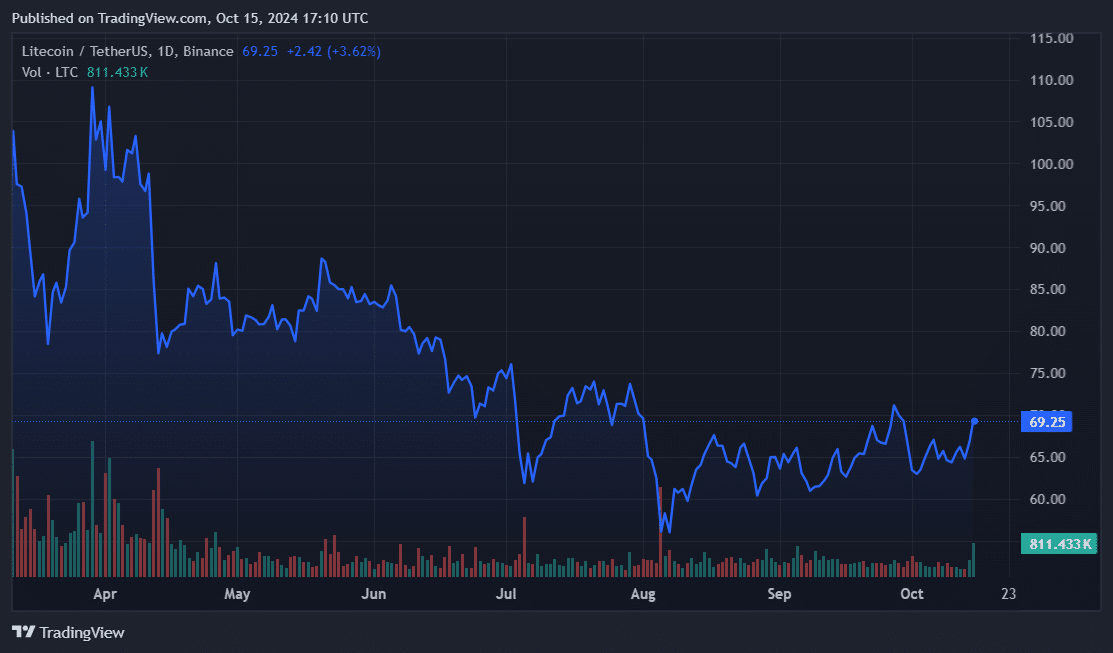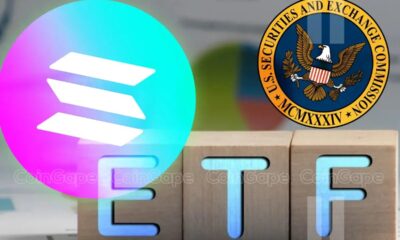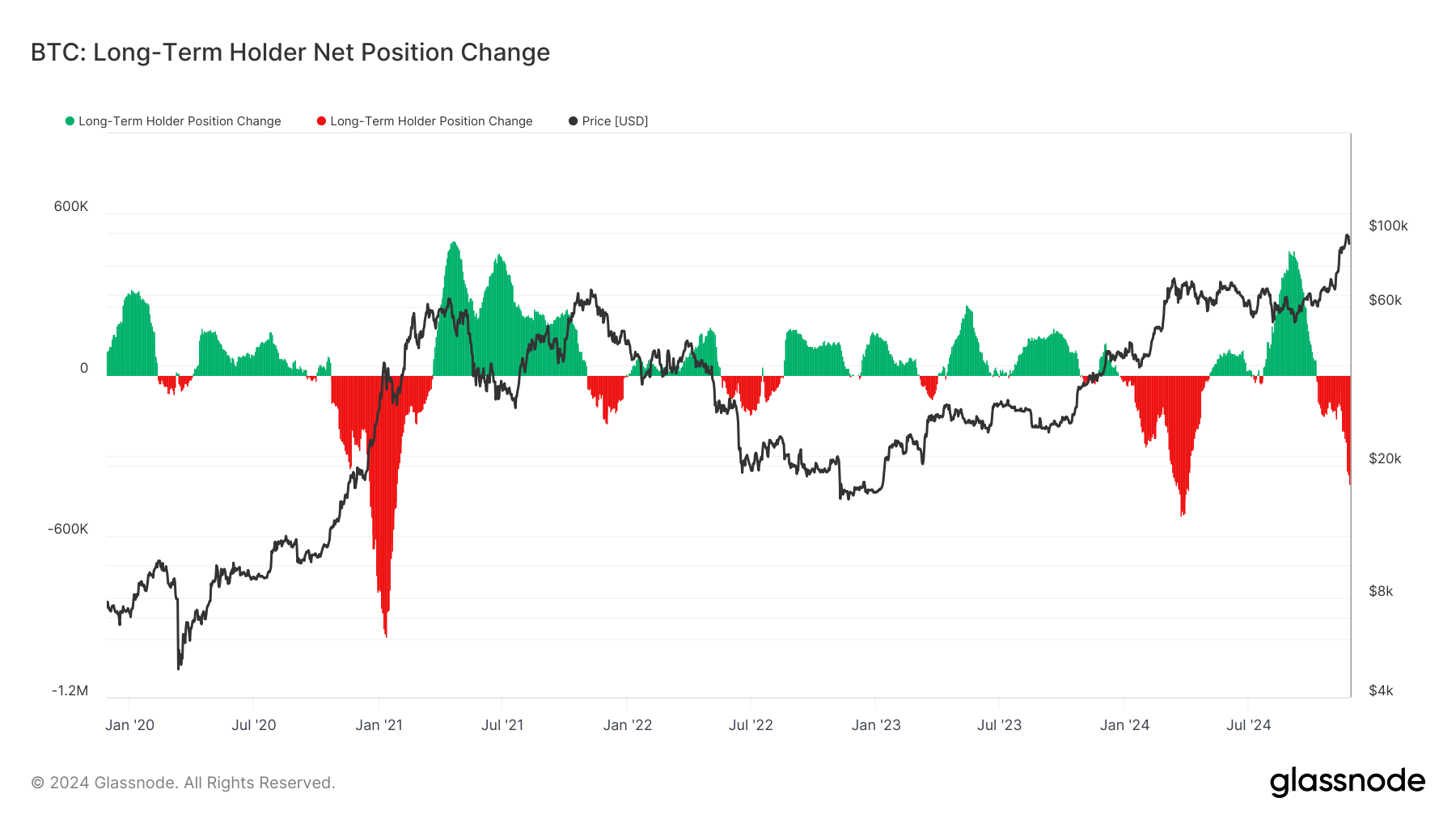ETF
Valkyrie Alumnus-founded Canary bids for spot Litecoin ETF
Published
2 months agoon
By
admin
Canary Capital filed with the U.S. Securities and Exchange Commission to list an exchange-traded fund underpinned by the Bitcoin-inspired cryptocurrency, Litecoin.
Crypto-focused investment startup Canary Capital filed paperwork with the Securities and Exchange Commission to bring a spot Litecoin (LTC) ETF to Wall Street trading terminals. The new wealth manager, launched by Valkyrie founder Steven McClurg, submitted documents, including a Form S-1, signaling the formal registration of securities for its spot LTC ETF.
Litecoin is one of the oldest blockchain assets and is often considered an offshoot of Bitcoin (BTC). However, LTC was built in 2011 as a lighter version of BTC rather than an actual Bitcoin fork. Thirteen years later, LTC traded at almost $70 per coin and had a market cap of over $5.25 billion. The token ranked 27th among the top 100 cryptocurrencies by valuation.

Canary Capital has jumped head-first into the crypto ETF bidding scene. Last week, the investment firm joined Bitwise to bid for a spot (XRP) ETF. On Oct. 1, Canaray unveiled its inaugural private fund focused on Hedera (HBAR) and called the Canary HBAR Trust.
Crypto ETF filings have become a regular theme at the SEC since some 11 issuers secured approval for spot Bitcoin funds in January. Spot Ethereum (ETH) ETFs followed in late July, sparking a mountain of speculation over which crypto would don the institutional ETF wrapper next.
Solana (SOL) and Ripple’s native token have featured as leading contenders for a crypto ETF after BTC and ETH. However, the SEC’s regulatory approach and perception of which tokens fall under securities laws leaves looming uncertainty.
Per Fortune, SEC chair Gary Gensler told hedge funds that Ethereum and Litecoin were not securities in 2018. This assertion and LTC’s similarities with Bitcoin could improve the chances of a spot LTC ETF. However, SEC leadership under Gensler remains largely skeptical of the crypto economy, and the product may receive pushback from agency staff.
Source link
You may like


The Satoshi Papers Explores The Role Of The State In A Post-Bitcoin World: An Interview With Natalie Smolenski


Stablecoin Issuer Tether Invests $775,000,000 Into YouTube Rival Rumble


Solana L2 Sonic includes TikTok users in airdrop


5 Tokens Ready For A 20X After Solana ETF Approval


Solana beats Ethereum in a key metric 3 months in a row


SCENE’s 2024 Person of the Year: Iggy Azalea
Bitcoin
Metaplanet shares added to Amplify Transformational Data Sharing ETF
Published
4 weeks agoon
November 28, 2024By
admin

Metaplanet has been added to the the Amplify Transformational Data Sharing ETF or BLOK, a global index that invests in leading blockchain companies including SBI Holding, MicroStrategy and Nvidia.
On Nov. 28, the Japanese investment firm announced its inclusion into BLOK, joining a lineup of 53 companies that engage in the development and utilization of blockchain technology. The ETF features leading industry players including MicroStrategy, Robinhood, Nvidia, and SBI Holdings.
According to the press release, Metaplanet’s estimated starting weight on the BLOK will be around 2.9%. As of Nov. 29, the companies occupying to top spots on the Amplify Transformational Data Sharing ETF Blockchain leaderboard include Core Scientific, HUT 8, Coinbase, Galaxy Digital, MicroStrategy and Robinhood.
BLOK is managed by Amplify ETFs and leverages an active strategy to find and invest in companies that utilize blockchain technology in its daily operations, serving as a guide for investors looking for opportunities to inject capital into the blockchain sector.
BLOK holds more than $930 million in net assets, cementing itself as a widely followed ETF in the blockchain investment landscape.
CEO of Metaplanet, Simon Gerovich, shared the news on his X account. He stated that Metaplanet’s inclusion into the Amplify Transformational Data Sharing ETF further highlights the growing recognition of Metaplanet’s Bitcoin(BTC) acquisition strategy and the firm’s status as “Japan’s leading Bitcoin Treasury Company.”
Nicknamed “Asia’s MicroStrategy” by market proponents, Metaplanet has accumulated a Bitcoin trove of 1,142 BTC, worth $109.21 million at current market prices.
Excited to announce that Metaplanet has been added to its second major ETF, the Amplify Transformational Data Sharing ETF (“BLOK”). This inclusion highlights growing recognition of our leadership as Japan’s leading Bitcoin Treasury Company. BLOK holds a 4.4% stake in Metaplanet. https://t.co/9mgfCmUtGd pic.twitter.com/d8RgaVUowm
— Simon Gerovich (@gerovich) November 28, 2024
Metaplanet currently stands in 14th place, with the ticker 3350 JP, holding a current market value of $23.04 million.
Earlier this month, Metaplanet was included in CoinShares’ Blockchain Global Equity Index, also known as the BLOCK Index. The index tracks the performance of 45 companies that dabble in crypto and blockchain technology.
As previously reported by crypto.news on Oct. 23, Japan regulators are still reluctant to adopt spot crypto ETFs despite countries like the U.S. and Hong Kong already approving ETFs, according to Sumitomo Mitsui Trust Asset Management.
Source link
Bitcoin
Bitcoin Long-Term Holders Have 163K More BTC to Sell, History Indicates: Van Straten
Published
4 weeks agoon
November 26, 2024By
admin
Bitcoin (BTC) has dropped 7.6% since it almost — but not quite — touched the psychological wall of $100,000 on Nov. 22.
That’s the biggest drop since Donald Trump won the U.S. presidential election, sparking a rally that sent the largest cryptocurrency by market capitalization soaring from a level of around $66,000 through its record high.
Even so, the slide isn’t out of the ordinary. In bull markets bitcoin typically tumbles as much as 20% or even 30%, so-called corrections that tend to flush out leverage in an overheated market.
A large part of the reason the bitcoin price didn’t get to $100,000 was the amount of profit-taking that took place. A record dollar value of $10.5 billion of profit-taking took place on Nov. 21, according to Glassnode data, the biggest day of profit-taking ever witnessed in bitcoin.

At the root of the action are the long-term holders (LTH), a group Glassnode defines as having held their bitcoin for more than 155 days. These investors are considered “smart money” because they tend to buy when the BTC price is depressed and sell in times of greed or euphoria.
From September to November 2024, these investors have sold 549,119 BTC, or about 3.85% of their holdings. Their sales, which started in October and have accelerated since, even outweighed buying from the likes of MicroStrategy (MSTR) and the U.S. spot-listed exchange-traded funds (ETFs).

How long is this selling pressure going to last?
What’s noticeable from patterns in previous bull markets in 2017, 2021 and early 2024, is that the percentage drop gets smaller each cycle.
In 2017, the percentage drop was 25.3%, in 2021 it reached 13.4% and earlier this year it was 6.51%. It’s currently 3.85%. If this rate of decline were to continue, that would see another 1.19% drop or 163,031 BTC, which would take the cohort’s supply to 13.54 million BTC.
Each time, the long-term investors’ supply makes higher lows and higher highs, so this would also be in line with the trend.
Source link
24/7 Cryptocurrency News
Hashdex Files Second Amendment for Nasdaq Crypto Index US ETF Approval
Published
4 weeks agoon
November 26, 2024By
admin
Asset management firm Hashdex has made further progress toward launching a cryptocurrency-focused exchange-traded fund (ETF) in the United States. According to an announcement on Nov. 25, the company has submitted its second amended S-1 application with the U.S. Securities and Exchange Commission (SEC).
Hashdex Second Amendment for Nasdaq Crypto Index US ETF
Hashdex’s latest filing represents another step in its ongoing efforts to secure regulatory approval for the Nasdaq Crypto Index US ETF. The ETF aims to provide investors with exposure to a diversified portfolio of cryptocurrencies.
Initially, the fund will include Bitcoin (BTC) and Ether (ETH), the only two assets currently listed in the Nasdaq Crypto US Index. However, the filing noted that the portfolio could expand to include other digital currencies over time.
The amended filing comes after Hashdex’s initial S-1 application was modified in October when the SEC sought additional time to review the proposal. The SEC has historically been cautious in approving cryptocurrency-related products, and the amended filings demonstrate Hashdex’s ongoing compliance efforts to meet regulatory requirements. Despite the US SEC’s stance, firms have continued to file for Spot exchange-traded fund (ETF) like the latest one by WisdomTree for an XRP ETF.
Growing Interest in Crypto Index ETFs
Crypto index ETFs have emerged as a key area of focus for asset managers as demand for diversified investment products grows. Industry observers compare these ETFs to traditional index funds, such as those tracking the S&P 500, which provide investors with broad market exposure.
“Index ETFs are efficient for investors — just like how people buy the S&P 500 in an ETF. This will be the same in crypto,” said Katalin Tischhauser, head of investment research at Sygnum, a cryptocurrency-focused financial institution.
Hashdex is not alone in its pursuit of a cryptocurrency index ETF. Other asset managers, such as Franklin Templeton and Grayscale, are also seeking approval for similar products. The Franklin Crypto Index ETF would track the CF Institutional Digital Asset Index, which, like the Nasdaq Crypto US Index, currently focuses on Bitcoin and Ethereum. Grayscale’s Digital Large Cap Fund, which holds a basket of cryptocurrencies including Bitcoin, Ethereum, Solana (SOL), and XRP, has also applied for conversion to an ETF.
Potential Regulatory Changes and Market Implications
The regulatory landscape for cryptocurrency ETFs in the United States could shift significantly in the coming months. The SEC’s current Chair, Gary Gensler, has announced plans to step down on Jan. 20, 2025. This timeline coincides with the start of Donald Trump’s second presidential term. Trump, who has expressed a pro-crypto stance, has previously criticized Gensler’s strict approach to cryptocurrency regulation and promised reforms aimed at fostering growth in the sector.
Regulatory analysts suggest that the leadership transition at the SEC may impact the approval process for cryptocurrency-related financial products. Bloomberg ETF analyst James Seyffart stated that approval for index ETFs holding altcoins like XRP and Solana may depend on whether the SEC considers these smaller assets compliant with existing rules.
“Regulatory concerns about altcoins in index ETFs could be reduced if most of the allocation remains in Bitcoin and Ethereum,” Seyffart explained. He added that while there is optimism about these products, the ultimate decisions will likely hinge on the incoming SEC administration’s priorities and approach.
Kelvin Munene Murithi
Kelvin is a distinguished writer with expertise in crypto and finance, holding a Bachelor’s degree in Actuarial Science. Known for his incisive analysis and insightful content, he possesses a strong command of English and excels in conducting thorough research and delivering timely cryptocurrency market updates.
Disclaimer: The presented content may include the personal opinion of the author and is subject to market condition. Do your market research before investing in cryptocurrencies. The author or the publication does not hold any responsibility for your personal financial loss.
Source link

The Satoshi Papers Explores The Role Of The State In A Post-Bitcoin World: An Interview With Natalie Smolenski

Stablecoin Issuer Tether Invests $775,000,000 Into YouTube Rival Rumble

Solana L2 Sonic includes TikTok users in airdrop

5 Tokens Ready For A 20X After Solana ETF Approval

Solana beats Ethereum in a key metric 3 months in a row

SCENE’s 2024 Person of the Year: Iggy Azalea

BTC Risks Falling To $20K If This Happens

Most Layer 2 solutions are still struggling with scalability

Here’s why Stellar Price Could Go Parabolic Soon

Perp-Focused HyperLiquid Experiences Record $60M in USDC Net Outflows

Experts say these 3 altcoins will rally 3,000% soon, and XRP isn’t one of them

Robert Kiyosaki Hints At Economic Depression Ahead, What It Means For BTC?

BNB Steadies Above Support: Will Bullish Momentum Return?

Metaplanet makes largest Bitcoin bet, acquires nearly 620 BTC

Tron’s Justin Sun Offloads 50% ETH Holdings, Ethereum Price Crash Imminent?
182267361726451435

Why Did Trump Change His Mind on Bitcoin?

Top Crypto News Headlines of The Week

New U.S. president must bring clarity to crypto regulation, analyst says

Will XRP Price Defend $0.5 Support If SEC Decides to Appeal?

Bitcoin Open-Source Development Takes The Stage In Nashville

Ethereum, Solana touch key levels as Bitcoin spikes

Bitcoin 20% Surge In 3 Weeks Teases Record-Breaking Potential

Ethereum Crash A Buying Opportunity? This Whale Thinks So

Shiba Inu Price Slips 4% as 3500% Burn Rate Surge Fails to Halt Correction

Washington financial watchdog warns of scam involving fake crypto ‘professors’

‘Hamster Kombat’ Airdrop Delayed as Pre-Market Trading for Telegram Game Expands

Citigroup Executive Steps Down To Explore Crypto
Mostbet Güvenilir Mi – Casino Bonus 2024

NoOnes Bitcoin Philosophy: Everyone Eats
Trending

 3 months ago
3 months ago182267361726451435

 Donald Trump5 months ago
Donald Trump5 months agoWhy Did Trump Change His Mind on Bitcoin?

 24/7 Cryptocurrency News4 months ago
24/7 Cryptocurrency News4 months agoTop Crypto News Headlines of The Week

 News4 months ago
News4 months agoNew U.S. president must bring clarity to crypto regulation, analyst says

 Price analysis4 months ago
Price analysis4 months agoWill XRP Price Defend $0.5 Support If SEC Decides to Appeal?

 Opinion5 months ago
Opinion5 months agoBitcoin Open-Source Development Takes The Stage In Nashville

 Bitcoin5 months ago
Bitcoin5 months agoEthereum, Solana touch key levels as Bitcoin spikes

 Bitcoin5 months ago
Bitcoin5 months agoBitcoin 20% Surge In 3 Weeks Teases Record-Breaking Potential



✓ Share: